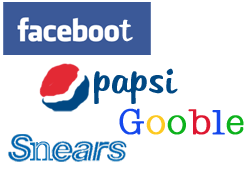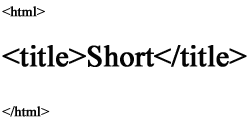
Anybody who has used popular social media sites like Twitter, Facebook, and the rest, has surely watched the imitation that happens every day. Somebody tweets, facebooks, or blogs about something “hot” and all of the sudden every other blogger scurries to their keyboard to blog about the same thing. If you catch on with things that are “hot” in a market, you have a greater chance of catching your 15 minutes of fame that was promised. Let’s face it, a lot of what we see each day on the internet is just the same thing, regurgitated with an alternate slant, and worded slightly different. If you look at any industry, you can see all the competitors mocking each other while only a few really stand out. Is that imitation really going to produce the results they are seeking? The odds are against it. There is a near infinitely greater chance of wasting time, energy, and money!
The Imitation Marketing Monster Eats Its Young
In this Internet age of vast information and lightening fast social media reach, we have collectively created a monster of sorts. What many people do not understand is that it is a monster that eats its young and as the cycle goes on, it eats itself.
Along with economic insecurity over the past couple years, it has become easy for people to believe they can save money by handling their own marketing. The Internet is the obvious place for this to happen, because it is easy. Anybody can put their name out there on the Internet and cross their fingers. The craze for do-it-yourself marketing on the Internet has created “marketers” out of about every living being that has a pulse, and a mouse to click with. Standing out from the crowd will take something unique, and not just “imitation marketing”. If you are up to the task, I am here to try and help you with my experience.
Whether you like this or not, you are right there in the thick of it. There is no other reason for you to read my blog than to try and know a better way to market what you offer and to become more profitable. Face it, you are here because you want more money, and you think you may pick up a tip to make that happen faster and cheaper than your competition. It is either that, or you have it in the back of your mind that you may pick up the phone and hire me to produce and implement a plan for your marketing … but that is only a tiny fraction of the people reading this. I am here to try and help you in either case, because it is what I do. I want to see you be successful.
I do not want to discourage you, and if I do, I will make it up to you with some encouragement. I am going to tell you what you are up against in your marketing, in order that you can prepare for the challenge.
Meeting the Creative Marketing Challenge
I just have to share a piece of reality in order to emphasize my point. Most of my readers are still swimming along in the vast open water and trying to stay afloat by imitating success. What they seldom realize is that by doing so they carry a higher risk of failure than hiring it out to experienced people like myself who do this all day long … for decades. They will soak up every bit of useful knowledge the vast Internet has to offer, and then try to create something more inspired and genius than all of the trained marketers who have facts, figures, creativity, and experience on their side.
Just as a simple example, consider how creative you are feeling today. Do you have it in you to write three, four, or five blog articles and marketing copy to promote your brand … or even one article? Do you have it in you to be sure what you produce is in front of hundreds of thousands of people … or even a thousand people? The right people? Can you write three books in three months (and actually have them sell) … or even one book? Can you write something and be assured that it will be listed within the top five results for the keywords you targeted less than ten minutes after you publish it … top 2,000 results? Do you have these things on your side? Well, I do, and there are others out there like me. That is what you are up against. When you get busy with your marketing, be aware that a lot of us make it a full time job, and some of us are damn good at what we do. To get ahead, you will have to be damn better.
The rampant drive for do-it-yourself marketing is one of those crazes that, like all other fads, has seen its time and is a wave that already crashed on the beach. It was a great idea, but when you are one of millions of people attempting to be the loudest, smartest, and overall best at what you do, your voice is squelched by the static. So, is there a fix? Yes! This is where I make it up to you if I discouraged you.
Stop Seeking Marketing Waves and Start Making your Own
Stop doing what they are doing. Stop trying to play follow the leader. Do something genius. If you spend your time making more waves and less time trying to catch one that is over your head, you have a lot better chance of surfing all the way to the beach. It may be easy to look at successful marketing and say “I can do that, too” but the odds are overwhelmingly against you. We trained and experienced marketers stacked the cards a long time ago as we earned our battle scars. We have been there, and we have done that. There are a lot of guys like me who spent 100 hours per week for years of our lives studying, practicing, learning, and tapping into every resource available to crush the competition of our clients. There is simply no way to beat us at our own game, so instead, you must create your own rules. Make your own waves. If you want to do it yourself, do not even try to do what everybody else is doing. You do not have the same resources as the competition, so don’t try to market as if you do. Take a serious inventory of your strategy and what resources you have at your disposal to implement that strategy. Stop trying to figure out how to do what the others are doing and get serious about what makes you different and better.
Tips for Overcoming Imitation Marketing
Try sitting in a quiet and dark room for an hour and think about what makes you different. Bring a voice recorder to take notes. Repeat this as often as you can. Read more books, blogs, and do everything you can to exercise your brain. The more you use it the more creative you will become. Read my blog. It really has a lot of great brain food to boost up your creativity. Start blogging! Read these really good reasons to blog and also read about how blogging improves intelligence. Seriously … go do it and stop trying to make excuses. This is for your benefit, after all. This is intended to help you increase your marketing talent.
Get really serious about what you are doing and stop letting yourself become comfortable. If you are going up against professional marketers, you are going to have to get serious with your marketing creativity, and it just doesn’t come naturally … it takes a lot of hard work. I get paid to make my clients successful, and if you want a piece of any market I am in, you had better brew another pot of coffee and plan to stay up all night.
Go sit in that quiet place and think really hard about how you are going to do something that nobody else is doing, and start figuring out how to make some waves. If you are not up to it, you should start getting settled with the lackluster results of “imitation marketing”, and be ready to take some heavy risks of failure. My hope for you is that you will try harder than ever, and take some of my tips. Otherwise, hire me to do the work for you and go get some rest … this marketing stuff is exhausting!




